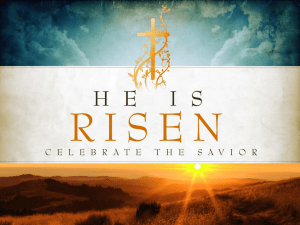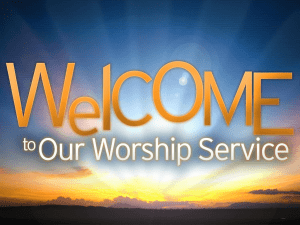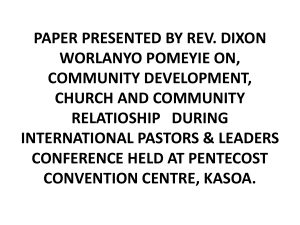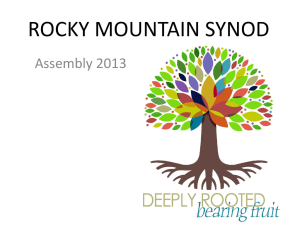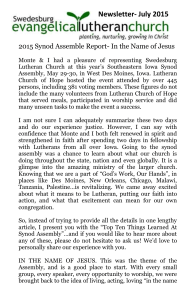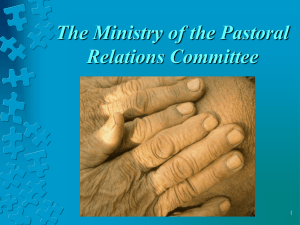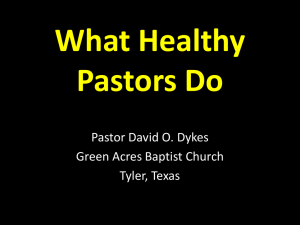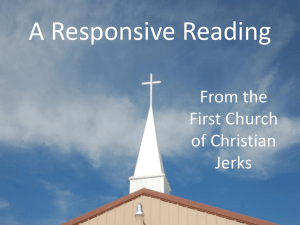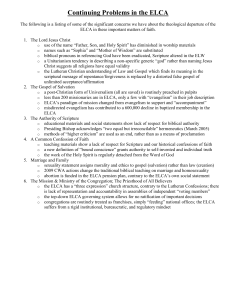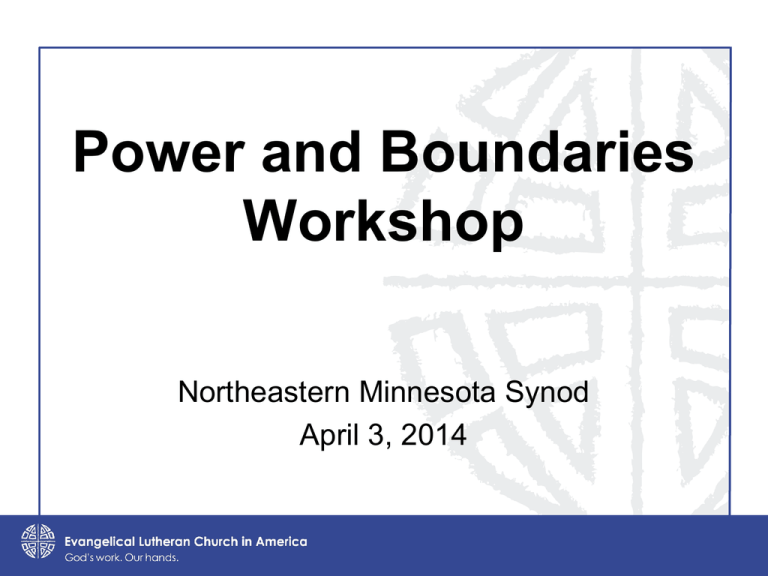
Power and Boundaries
Workshop
Northeastern Minnesota Synod
April 3, 2014
Boundary Basics
Any line or thing marking a limit
“Good fences make good neighbors.”
Highway boundaries make it safe to be
on the road together
The parking lot!
Relationship Boundaries
Keep us faithful to the purpose of the
relationship; make it possible to be in relationship
in ways that are helpful, meaningful, and safe
Boundaries protect and preserve
Boundaries provide focus and direction
Boundaries are self-discipline
Boundaries clarify our intentions
Boundaries are not arbitrary
Boundaries convey respect
Explicit boundaries
Ethical codes, laws, policies, personnel
manuals
Implicit boundaries
Informal, contextual, common, traditional
expectations
Blurred boundaries
ELCA Landscape
Written ethical expectations
Vision and Expectations
• Ordained Ministers
• Associates in Ministry, Deaconesses,
Diaconal Ministers
Established disciplinary procedures
Definitions and Guidelines for Discipline
Boundary concerns not new
Not private or personal
Consequences for victim
Consequences for professional
Consequences for congregation
Consequences for whole church
Not just about clergy sexual misconduct
In the ELCA:
Not all disciplinary cases involve sex
Most sexual cases involve male rostered
personnel and adult females
Have been cases where perpetrator is female
Have been homosexual cases since 2009,
male and female
Child sexual abuse cases are rare, but
especially egregious
Discipline administered through synod of
roster
Written synod policy
Zero tolerance
No report ignored
Proven misconduct has consequences
Truth is told
Church’s Response to Sexual
Misconduct – Synod Policy
Preparation
Initial Contact – First Response
Initial Investigation
Conversation with the pastor
Assess information
Consultation
Formal Hearing
Disclosure
Follow-up
Minnesota Civil Liability
Statute 604
Action for Sexual Exploitation;
Psychotherapists
Clergy defined as psychotherapists
5-year background check
MN Child Victims Act
Six year Statute of Limitations if victim over 18
NO SOL is victim under 18
Action for damages against a person who committed
sexual abuse or was negligent
“person” includes a natural person, corporation, LLC,
partnership, organization, association, or other entity
Now in effect
3-year open window for old cases
Boundary Crossings
Roles are reversed
Often not a single event
It’s about behaviors, not feelings
You control what you do/say; you can’t
control what the other hears/experiences
It’s ALWAYS the responsibility of the
professional
Frequent Boundary Struggles
• Church finances
• Dual relationships
• Separation issues
Situation 1:
You are in your fourth month of a new call. A long time
member has just passed away after a long illness.
When meeting with the member’s spouse, he/she says
the family would like the previous minister to conduct
the funeral. The spouse is very clear that the previous
pastor “knows the family better than you ever could,
especially because you are new to the congregation.
So, I’ve already contacted the previous pastor who has
agreed to come.”
• How do you respond to the member?
• How do you respond to the previous pastor when
he/she calls?
• How would you respond if you should get such a call
from a former member?
• When is it appropriate to return to a prior call to
conduct funeral, wedding, baptism, confirmation, pay a
pastoral hospital visit?
• How do you respond to a former member’s criticism of
the new pastor?
• What would be some “best practices” that
might prevent this situation?
Confidentiality
Mandated Reporting – MN law
Know or have reason to believe within the
preceding three years
Professional or professional’s delegate
Member of the clergy, while engaged in
ministerial duties, provided not privileged
Any person can voluntarily report
Privileged Communication
Minnesota Law
•
•
•
•
Rules/practice of the religious body
Consent of the party making confession
Shall not be allowed to disclose
Cannot be examined
ELCA Constitution (7.45.)
• Historic discipline and practice of the Lutheran church
• true to sacred trust inherent in the pastoral office
• confidential disclosure received in the course of the care of
souls or observed
• while working in a pastoral capacity
• except with express permission of the person or if person
intends great harm to self or others
However, the ELCA encourages immediately reporting
to the civil authorities all instances of child abuse
regardless of personal confidentiality issues.
Call local law enforcement or go to the state
government website to find the appropriate office for
reporting child abuse.
•
•
•
•
•
•
•
Use of power
Physical contact
Place and space
Time and access
Gifts and services
Clothing and language
Self-disclosure
Power
Ministry
Cultural
•
•
•
•
•
•
•
•
•
•
•
•
•
•
•
•
•
•
•
•
Credentials
Knowledge
Training, skills
Opportunities, access
Freedom
Traditions
Colleagues
Gifts, charism
Respect, trust
Expectations
Age
Physical size, strength
Gender
Social class
Economic status
Health
Social contacts
Race/ethnicity
Experience
Marital status
Vulnerability
•
•
•
•
•
•
•
•
•
Danger
Pain
Doubt
Loss
Isolation
Illness
Confusion
Anxiety
Shame
•
•
•
•
•
•
•
•
•
Ignorance
Guilt
“Overload”
Depression
Naiveté
Fear
Grief
Panic
Estrangement
Vulnerability Formula
• Relative presence/absence of pastor’s resources; esp.
as perceived by parishioner, pastor; measured
alongside
• Resources/conditions operative in parishioner’s life;
plus
• Assumption/expectation pastor will provide skilled care
in parishioner’s best interest
Risk Factors (pastor)
•
•
•
•
•
•
•
Isolation
Few outside interests
Family relationships ignored
No accountability
Long hours/days; pastor does everything
Financial problems
“Counseling”
• Know your turf
Consistent with the faith and practice of the ELCA,
a) Every ordained minister shall:
4) provide pastoral care
ELCA Constitution 7.31.12
NOTE: NOT counseling
•
•
•
•
•
Substance abuse
Coping without professional help
Needy; one of the gang
Too personal
Too much time on computer; overuse of social
media
• Personal history
Risk Factors (congregation)
• Past history, known or unknown
• Unequal balance of power
– Leadership controls everything
– Leadership is weak
Situation 2:
Use your own role in ministry: A parishioner is very
complementary to you, very supportive, has sent notes
on occasion and verbally expressed appreciation.
Recently, he/she has given you a couple of small gifts.
You are aware of some uncomfortable feelings you
have with this situation. You talk with the person about
your concerns—this only serves to fuel an even more
positive reaction. You get more cards and letters
expressing respect and admiration for your honesty—
which has only increased their attraction to you.
• What are some of the dynamics going on?
• What are some of the risks? Or benefits?
• What do you do/how do you respond? What are your
options?
• How do you balance the needs of the parishioner with
your responsibilities as a pastor?
Keeping balance
• Keep routine schedule, work locations, esp. when
working “alone”
• Keep some record of professional activity, review own
pattern
• Take time/days off
• Maintain confidentiality
• Regular supervision, collegial consultation
• Pay attention to health
• Pay attention to relationships, esp. family
• Pay attention to your spiritual needs
• Seek professional help in dealing with personal
issues
• Watch out for one another
• Be self-aware
• “Would you want. . .?”
Lifelong Ethical Practice
• Awareness
• Alliances
• Attention
• Action
Social Media
Immediate and interactive
“Social media are a collection of online platforms and
tools that people use to share content, profiles,
opinions, insights, experiences, perspectives, and
media itself, facilitating conversations and interactions
online between groups of people.”
-Doreen Moran, Digital and Social Marketing
Quick-• Name as many social media sites as you can
think of
– Are you a cyber-native?
– Or a cyber-immigrant?
– Or cyber-ignorant?
• How do you use social media in your
ministry?
– Communication
– Pastoral care
– Evangelism
– Building relationship
– Sharing resources
• What challenges have you had?
– Time-consuming
– Saying negative things about others
– Cyber bullying
– Over-sharing
– Facebook ranting
– Public/private
Social Media Boundary Issues
•
•
•
•
•
Initiation
Setting an example
TMI
Responding to inappropriate activity
Leaving
Social Media Best Practices
• Have a congregational social media policy
• Think about getting a social media buddy
• Practice the
– “church announcement rule”
– “30 minute rule”
– “Thumper’s mother’s rule”
• Protect identity and maintain confidentiality—especially
information about children
Disclaimer
The information and material shared with you today has been put
together by Pastor Karen G. Bockelman and does not represent
an official position on the part of the Northeastern Minnesota
Synod or the ELCA. It does not constitute legal advice to anyone.
This material may or may not be appropriate for your specific
needs or congregation. Members of the ELCA, rostered leaders,
congregations, synods, and others affiliated with this church
should always consult their own attorneys, accountants, or similar
professionals in the development of policies, procedures, forms,
etc. or whenever legal issues or problems arise.

